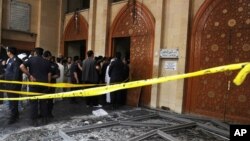Kuwait said Sunday it has identified a Saudi national as the suicide bomber that attacked a crowded Shi'ite mosque, killing 27 people and wounding 227 others.
The Interior Ministry said Fahd Suleiman Abdulmohsen al-Qaba'a is responsible for Friday's assault on the mosque during the holy month of Ramadan.
Authorities said he flew into the country at dawn Friday, just hours before detonating the explosives. Kuwait said it has detained the driver of the vehicle that took him to the mosque, the owner of a house where the driver was staying and five others in connection with the attack.
The incident in Kuwait was one of three terrorist attacks Friday on three continents.
Tunisia deployed 1,000 extra police at tourist sites and beaches in the North African country as hundreds of foreign tourists fled following a terrorist attack at a seaside resort.
Tunisian Prime Minister Habib Essid ordered army reservists deployed at hotels and other tourist sites, and said that about 80 mosques known for radical preaching would be shut down.
At least 38 people were killed and dozens more wounded Friday when a young Tunisian militant disguised as a tourist opened fire on a private beach and other facilities of the five-star Imperial Marhaba Hotel in Sousse. The beach, crowded on Friday with European and regional tourists, has since been empty, blocked off by police tape.
Tunisia's Health Ministry said Saturday it had identified the bodies of 17 people from Britain, Germany, Ireland, Belgium and Portugal, while still trying to identify others shot dead in their beach attire.
In southern France, a man stormed an American-owned chemical plant, decapitating one person, his boss, and defacing the body with Arabic writings while trying to blow up the facility. A suspect is in custody and authorities said he has admitted the killing.
In a statement Friday, the White House described the assaults as heinous. Other world leaders, including U.N. Secretary-General Ban Ki-moon and European heads of state, also condemned the attacks.
Responsibility
In a Twitter statement, Islamic State extremists took credit for the Tunisian slaughter, identifying the gunman as Abu Yahya al-Qayrawani. The Sunni group also claimed responsibility for the Kuwait mosque bombing.
U.S. officials said it was not immediately clear whether all three attacks were coordinated by the Syria- and Iraq-based Islamic State.
Christopher Chivvis, associate director, RAND International Security and Defense Policy Center, said the factory attack shows that secular France is the target of both al-Qaida and the Islamic State group.
He also said the resort attack in Tunisia targeted the last vestige of fully-functioning state security in North Africa.
"It’s the only state that’s maintained a democracy after the Arab Spring, but the Islamic State clearly has it in its sights, and in the case of Kuwait, it’s obviously an important American ally in the region, so it should be a concern that it’s been targeted by the Islamic State,” said Chivvis.
Taking credit
Michael Pregent, adjunct lecturer on international security affairs at the National Defense University, said while it would be a mistake to assume that all three attacks were coordinated by the Islamic State group, the militants could easily claim credit.
“They’ve basically given license to anybody to claim affiliation with ISIS when they carry out a terrorist attack, even though there is no formal affiliation,” said Pregent, using another of the group’s acronyms.
“If you do anything in the name of ISIS, that’s good. ISIS doesn’t have to spend money on your operation, ISIS doesn’t have to coordinate it, ISIS doesn’t have to do anything, but they get credit for these things,” Pregent told VOA.
Few strategic gains
Regardless of the horror factor of the three assaults, Pregent said ISIS did not gain much strategically from the attacks. He added that the violence did not compare with the 2005-2006 Ramadan campaigns of its predecessor, al-Qaida in Iraq.
“It is not impressive compared to what al-Qaida was able to do. In 2005, you had 56 attacks a day in Baghdad, 56 attacks a day; car bombs, kidnappings, assassinations,” Pregent said.






